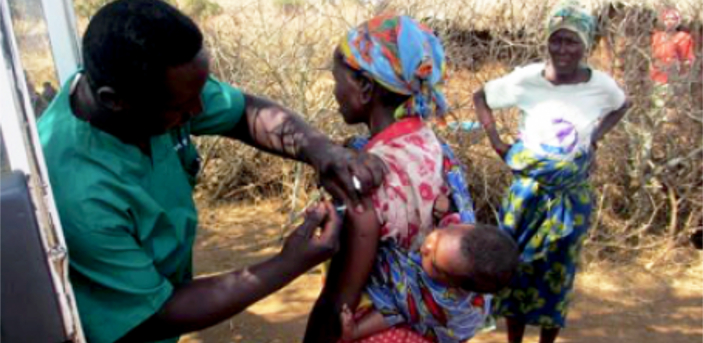Controversy is brewing in Kenya over allegations by the Catholic Bishops of Kenya and the Kenya Catholic Doctors Association that a tetanus vaccine sponsored by the World Health Organization (WHO) and the United Nations Children’s Fund (UNICEF) is laced with a hormone that causes miscarriages and infertility.
UNICEF denies that the vaccine is tainted and the WHO says the “allegations are not backed by the evidence.”
Both the WHO and UNICEF say the vaccines “are safe,” and UNICEF states the “Catholic bishops are wrong” and are “putting children at risk.” Kenya’s Ministry of Health also asserts the vaccine is safe.
The bishops, who help oversee 58 Catholic hospitals, 83 health centers, 311 dispensaries, and 18 medical training schools in Kenya – a country where the Church has been providing medical care for more than 100 years – say their independent tests of the vaccine show the hormone is present, and that the vaccination campaign is a “disguised population control program.”
Tetanus is an infectious disease caused by a neurotoxin of a bacterium (Clostridium tetani), which is usually introduced through dirty wounds or the umbilical cord if cut with a non-sterile instrument. The disease causes muscle spasms, particularly in the jaw, and if left untreated, death.
Tetanus can be prevented by administering a Tetanus Toxoid (TT) vaccine, using a syringe. “To prevent maternal and neonatal tetanus, appropriate doses of tetanus toxoid need to be given to the mother before or during pregnancy, and clean delivery and cord care practices need to be ensured,” states the WHO.
The hormone that the bishops and the Kenya Catholic Doctors Association say is present in the tetanus vaccine is Human Chorionic Gonadotropin (HCG). After conception, a human embryo produces HCG, which prepares the embryo to be implanted in the womb.
“After implantation, HCG causes the mother’s body to continue to make the pregnancy hormones necessary for the mother’s body to carry the unborn child,” Dr. Donna Harrison, an OB/GYN and executive director of the American Association of Prolife Obstetricians and Gynecologists, told CNSNews.com.
“HCG is also the chemical that is tested in pregnancy tests,” said Dr. Harrison. “Specifically, pregnancy tests check a woman’s blood or urine for the presence of a specific part of the HCG compound, called ‘beta HCG,’ which is the part of the HCG molecule which does not cross react with other hormones in the body, and can be detected shortly after fertilization.”
Vaccines, she explained, “work by taking a piece of virus bacteria and mixing it with an ‘adjuvant,’ a compound to stimulate the immune system. When a person receives a vaccine in their body, the immune system, stimulated by the adjuvant, starts making ‘antibodies’ to fight the piece of bacteria or virus in the vaccine. Then the immune system ‘remembers’ that piece of virus or bacteria so that the next time that the body encounters that bacteria or virus, the immune system immediately ramps up to full steam and eliminates the offending agent.”
“When HCG is mixed into the tetanus vaccine, then the body not only makes antibodies to tetanus toxin, but also makes antibodies to HCG,” said Dr. Harrison. “What that does is cause a woman’s body to ‘reject’ the embryo, to make antibodies against the embryo just as if the embryo were an attacking pathogen.”
If the claims about the tetanus vaccine are true, said Dr. Harrison, “you’ve got a drug, forced sterilization. It’s an issue of using a good thing, a tetanus vaccine, and deceiving people – you’ve ruined people’s trust in the health care system for a life-saving drug in order to introduce something that is without patient consent.”
In a Nov. 6 statement, the Kenya Conference of Catholic Bishops (KCCB) emphasized that the Catholic Church is not opposed to regular vaccines administered in Kenya.
“The Catholic Church struggled and acquired several vials of the vaccine, which we sent to four unrelated Government and private laboratories in Kenya and abroad,” say the bishops, adding “that all the tests showed that the vaccine used in Kenya in March and October 2014 was indeed laced with the Beta- HCG hormone.”
The WHO and UNICEF, however, say the results of those tests are “invalid,” and UNICEF told CNSNews.com that it “definitely” supports having independent laboratories test the vaccine.
The WHO and UNICEF released a joint-statement to cnsnews.com on Nov. 12 said the allegations about the Tetanus Toxoid (TT) Vaccine in Kenya “are not backed up by the evidence, and risk negatively impacting national immunization programmes for children and women.”
Read more of the story on cnsnews.com





